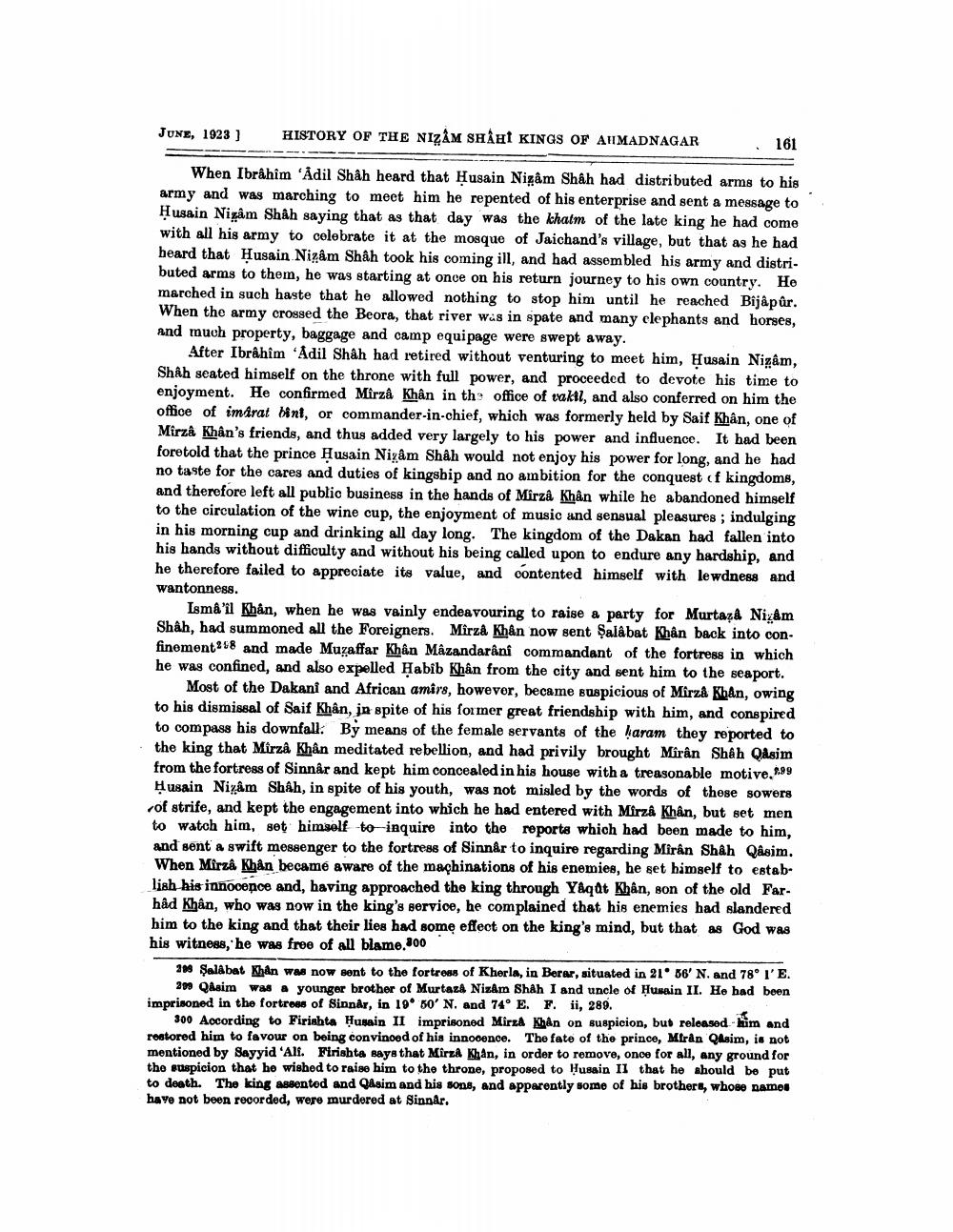________________
JUNE, 1923 ]
HISTORY OF THE NIZAM SHAHI KINGS OF AHMADNAGAR
When Ibrahim 'Adil Shâh heard that Husain Nigâm Shâh had distributed arms to his army and was marching to meet him he repented of his enterprise and sent a message to Husain Nizam Shah saying that as that day was the khatm of the late king he had come with all his army to celebrate it at the mosque of Jaichand's village, but that as he had heard that Husain Nizâm Shâh took his coming ill, and had assembled his army and distributed arms to them, he was starting at once on his return journey to his own country. He marched in such haste that he allowed nothing to stop him until he reached Bîjâpûr. When the army crossed the Beora, that river was in spate and many elephants and horses, and much property, baggage and camp equipage were swept away.
After Ibrahim Adil Shah had retired without venturing to meet him, Husain Nizâm, Shah seated himself on the throne with full power, and proceeded to devote his time to enjoyment. He confirmed Mirzâ Khân in the office of vaktl, and also conferred on him the office of imårat bint, or commander-in-chief, which was formerly held by Saif Khân, one of Mirza Khân's friends, and thus added very largely to his power and influence. It had been foretold that the prince Husain Nigâm Shâh would not enjoy his power for long, and he had no taste for the cares and duties of kingship and no ambition for the conquest cf kingdoms, and therefore left all public business in the hands of Mirza Khân while he abandoned himself to the circulation of the wine cup, the enjoyment of music and sensual pleasures; indulging in his morning cup and drinking all day long. The kingdom of the Dakan had fallen into his hands without difficulty and without his being called upon to endure any hardship, and he therefore failed to appreciate its value, and contented himself with lewdness and wantonness.
161
Ismâ'il Khân, when he was vainly endeavouring to raise a party for Murtaza Nizam Shah, had summoned all the Foreigners. Mirza Khân now sent Salâbat Khân back into confinement 28 and made Muzaffar Khân Mâzandarânî commandant of the fortress in which he was confined, and also expelled Habib Khân from the city and sent him to the seaport.
Most of the Dakani and African amirs, however, became suspicious of Mirza Khân, owing to his dismissal of Saif Khân, in spite of his former great friendship with him, and conspired to compass his downfall. By means of the female servants of the haram they reported to the king that Mirza Khân meditated rebellion, and had privily brought Mîrân Shah Qasim from the fortress of Sinnår and kept him concealed in his house with a treasonable motive.99 Husain Nizam Shah, in spite of his youth, was not misled by the words of these sowers of strife, and kept the engagement into which he had entered with Mirza Khân, but set men to watch him, set himself to inquire into the reports which had been made to him, and sent a swift messenger to the fortress of Sinnår to inquire regarding Mirân Shah Qasim. When Mirza Khan became aware of the machinations of his enemies, he set himself to estab lish his innocence and, having approached the king through Yaqut Khân, son of the old Farhâd Khân, who was now in the king's service, he complained that his enemies had slandered him to the king and that their lies had some effect on the king's mind, but that as God was his witness, he was free of all blame,300
299 Salabat Khan was now sent to the fortress of Kherla, in Berar, situated in 21° 56' N. and 78° 1' E. 299 Qasim was a younger brother of Murtaza Nizam Shah I and uncle of Husain II. He had been imprisoned in the fortress of Sinnar, in 19° 50' N. and 74° E. F. ii, 289.
300 According to Firishta Hussin II imprisoned Mirza Khan on suspicion, but released him and restored him to favour on being convinced of his innocence. The fate of the prince, Miran Qasim, is not mentioned by Sayyid 'Ali. Firishta says that Mirza Khan, in order to remove, once for all, any ground for the suspicion that he wished to raise him to the throne, proposed to Husain II that he should be put to death. The king assented and Qasim and his sons, and apparently some of his brothers, whose names have not been recorded, were murdered at Sinnår.




